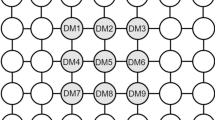Abstract
This paper explores a situation in which a population split into two groups attempts to achieve the socially efficient outcome of a coordination game between the groups. But, in addition to the coordination game, a second kind of interaction takes place inside each group trying to fulfill internal social aims such as acceptance or approval. To achieve these strategic and social concerns, a learning process comes about inside each group. The accomplishment of the social concerns depends only upon the popularity of the strategies inside each social group. We refer here to skeptical individuals as those that do not feel so much coerced by social influence in relation to social objectives. Our study reveals that a skeptical population can achieve coordination between the two groups, but it can also evolve to other final states, namely, anticoordination, dynamical coexistence of strategies and payoff inferior equilibrium. We analyse the causes that give rise to these final states in the whole range of initial distributions of strategies. Our analysis discloses a highly nontrivial behaviour observed in many real-life situations: We find that for high levels of skepticism a society can coordinate in the socially efficient coordination outcome, which can not be obtained for lower levels of skepticism. We also describe how such coordination is possible in a risky environment. We provide numerical simulations that describe the complexity of the different scenarios.



Similar content being viewed by others
References
Alm J, McKee M (2004) Tax compliance as a coordination game. J Econ Behav Organ 54(3):297–312
Anderson L, Holt C (1997) Information cascades in the laboratory. Am Econ Rev 87(5):847–862
Battalio R, Samuelson L, Van Huyck J (2001) Optimization incentives and coordination failure in laboratory stag hunt games. Econometrica 69:749–764
Bikhchandani S, Hirshleifer D, Welch I (1998) Learning from the behavior of others: conformity, fads, and informational cascades. J Econ Perspect 12(3):151–170
Blume L, Durlauf S (2003) Equilibrium concepts for social interaction models. Int Game Theory Rev 5:193–209
Charbit C (2011) Governance of public policies in decentralised contexts: the multi-level approach. OECD regional development working papers, 2011/04, OECD Publishing https://doi.org/10.1787/5kg883pkxkhc-en
Chisholm D (1992) Coordination without hierarchy: informal structures in multiorganizational systems. University of California Press, Berkeley
Clark K, Kay S, Sefton M (2001) When are nash equilibria self enforcing? An experimental analysis. Int J Game Theory 29:495–515
Conradt L, Roper TJ (2005) Consensus decision making in animals. Trends Ecol Evol 20:449–456
Crawford VP, Gneezy U, Rottenstreich Y (2008) The power of focal points is limited: even minute payoff asymmetry may yield large coordination failures. Am Econ Rev 98(4):1443–58
Friedman D (1996) Equilibrium in evolutionary games: some experimental results. Econ J 106:1–15
Granovetter M (1978) Threshold models of collective behaviour the American. J Sociol 83:1420–1443
Harsanyi JC, Selten R (1988) A general theory of equilibrium selection in games, vol 1. MIT Press Books, Cambridge
Lugo H, San Miguel M (2015) Learning and coordinating in a multilayer network. Sci Rep 5:7776
Maynard Smith J (1982) Evolution and the theory of games. Cambridge University Press, Cambridge
Straub Paul G (1995) Risk dominance and coordination failures in static games. Q Rev Econ Financ 35(4):339–363
Weidenholzer S (2010) Coordination games and local interactions: a survey of the game theoretic literature. Games 1(4):551–585
Acknowledgements
We thank the editor and the anonymous referees for their careful reviews on an earlier version of this paper. Haydée Lugo acknowledges financial support from Ministerio de Economía y Competitividad (Spain) under Project No. ECO2016-75992-P. Maxi San Miguel acknowledges financial support from Agencia Estatal de Investigación (AEI, Spain) and Fondo Europeo de Desarrollo Regional under project ESOTECOS FIS2015-63628-C2-2-R (MINECO/AEI/FEDER,UE).
Author information
Authors and Affiliations
Corresponding author
Rights and permissions
About this article
Cite this article
González-Avella, J.C., Lugo, H. & San Miguel, M. Coordination in a skeptical two-group population. J Econ Interact Coord 14, 203–214 (2019). https://doi.org/10.1007/s11403-018-0223-x
Received:
Accepted:
Published:
Issue Date:
DOI: https://doi.org/10.1007/s11403-018-0223-x




